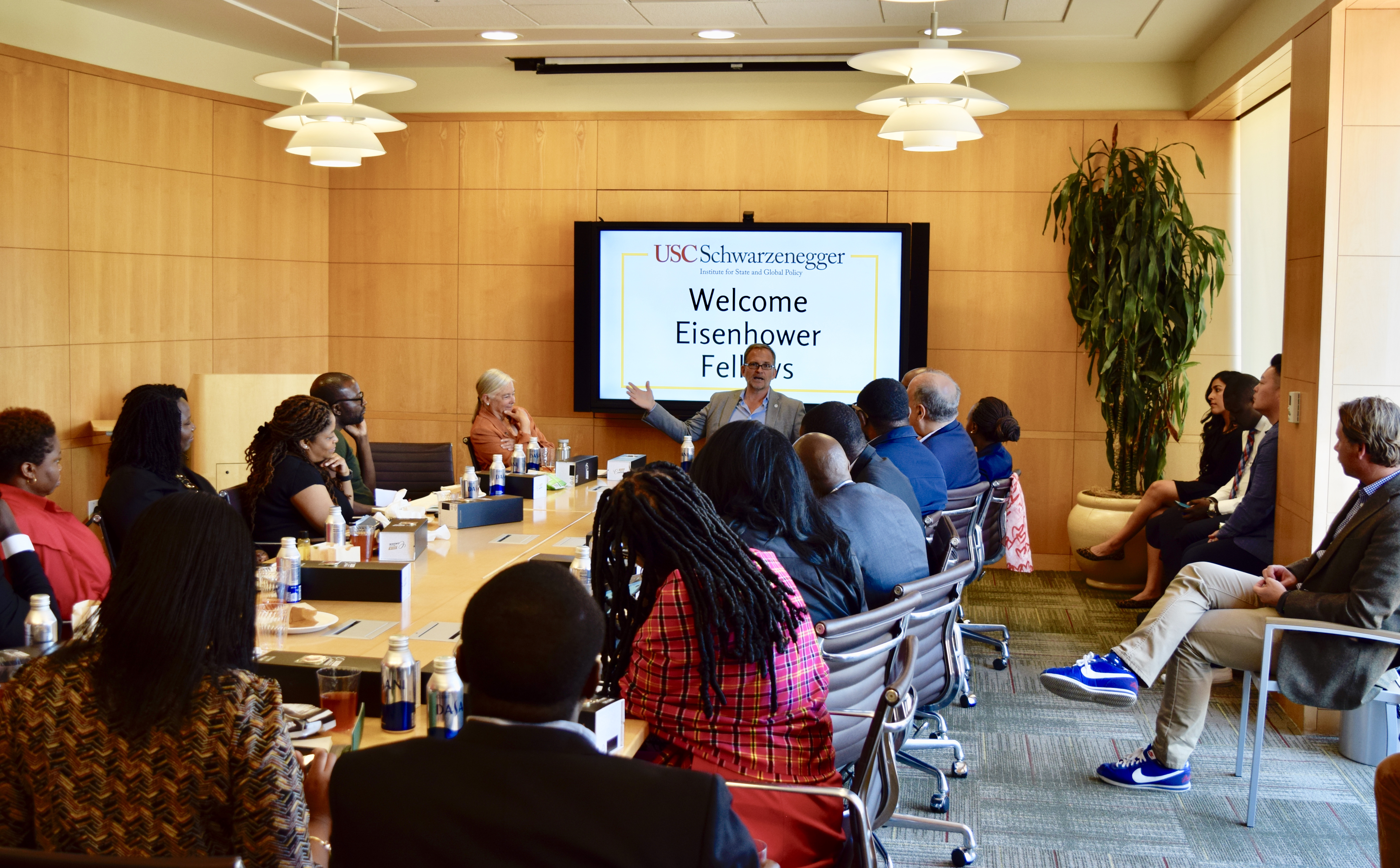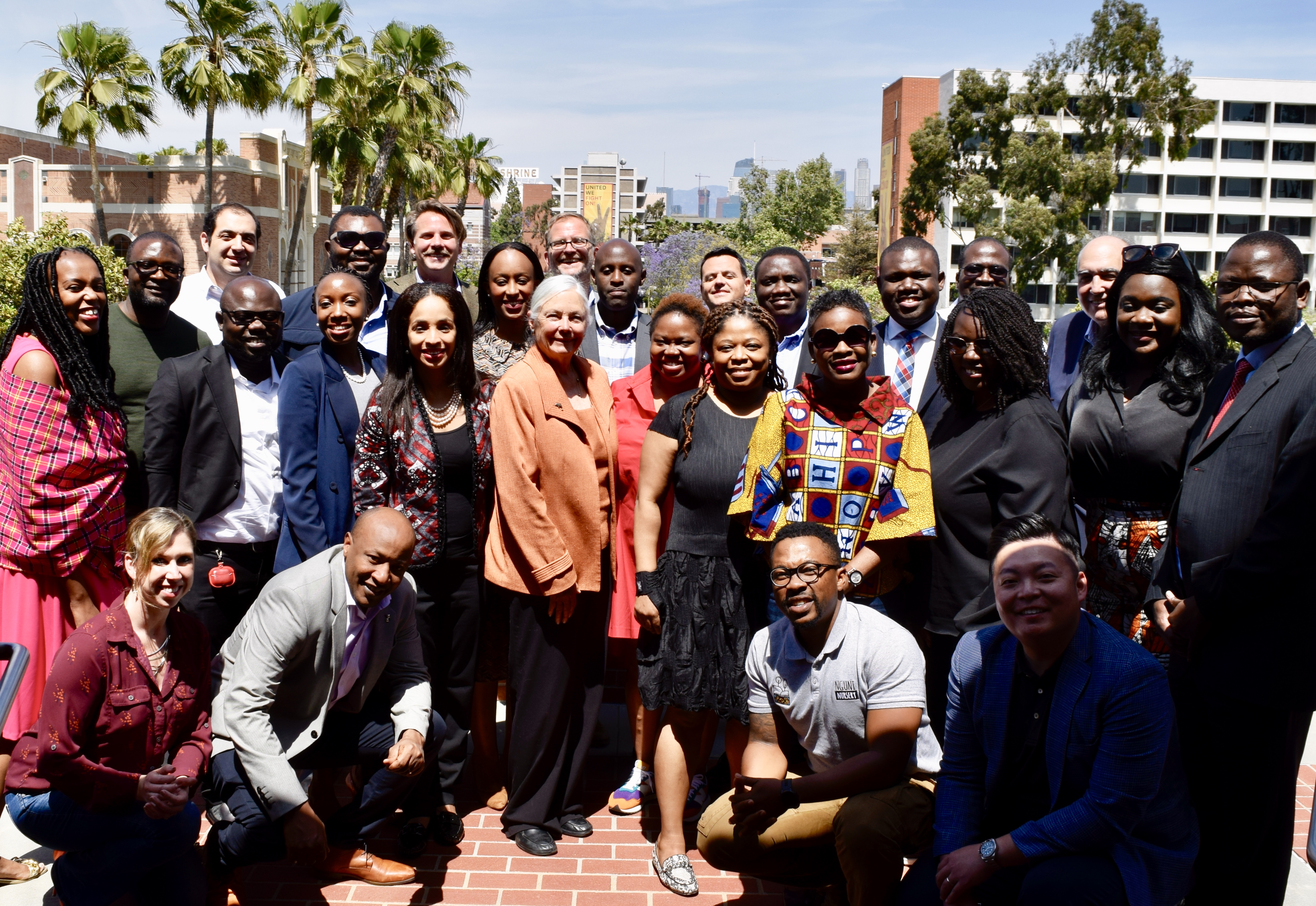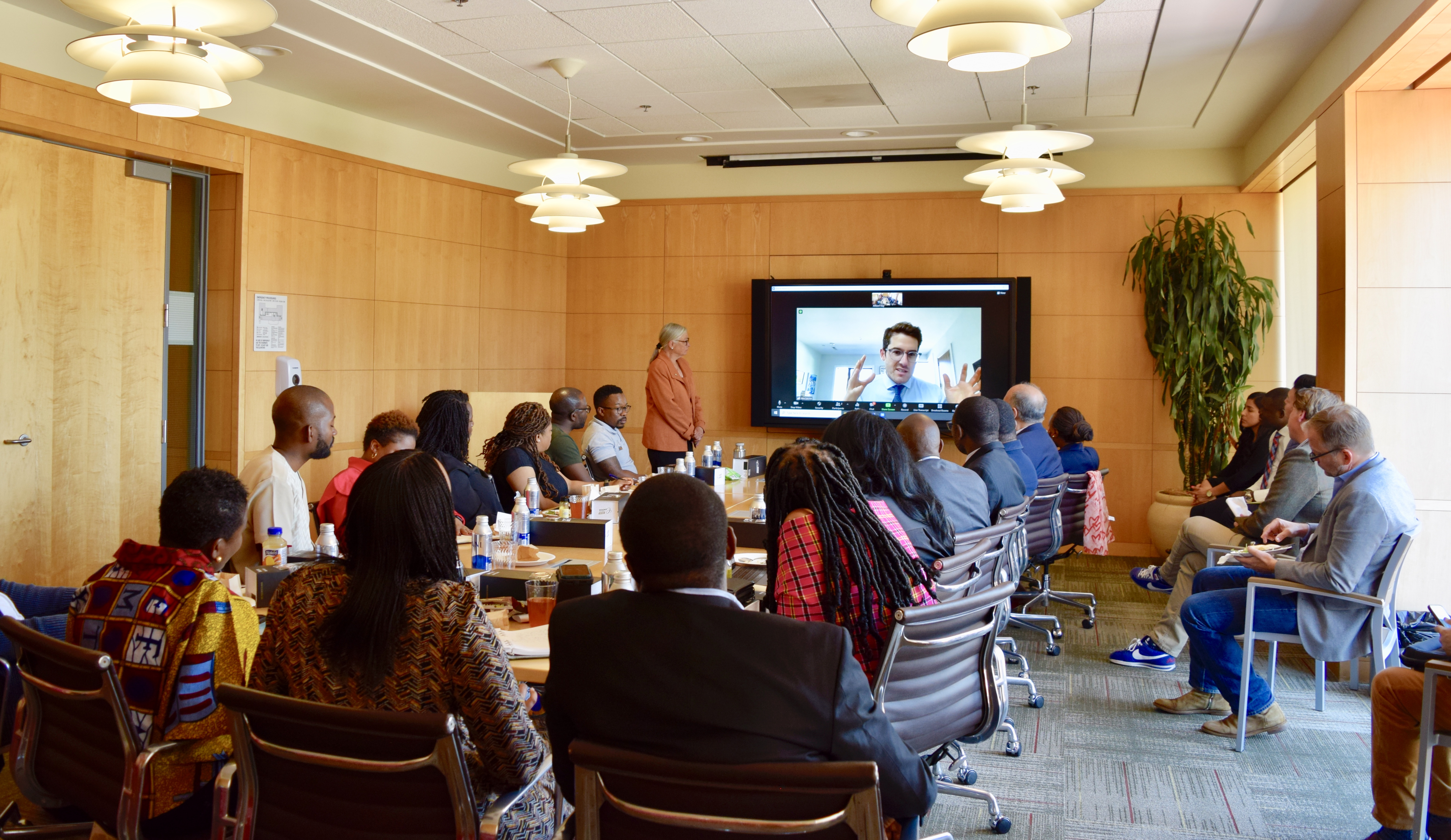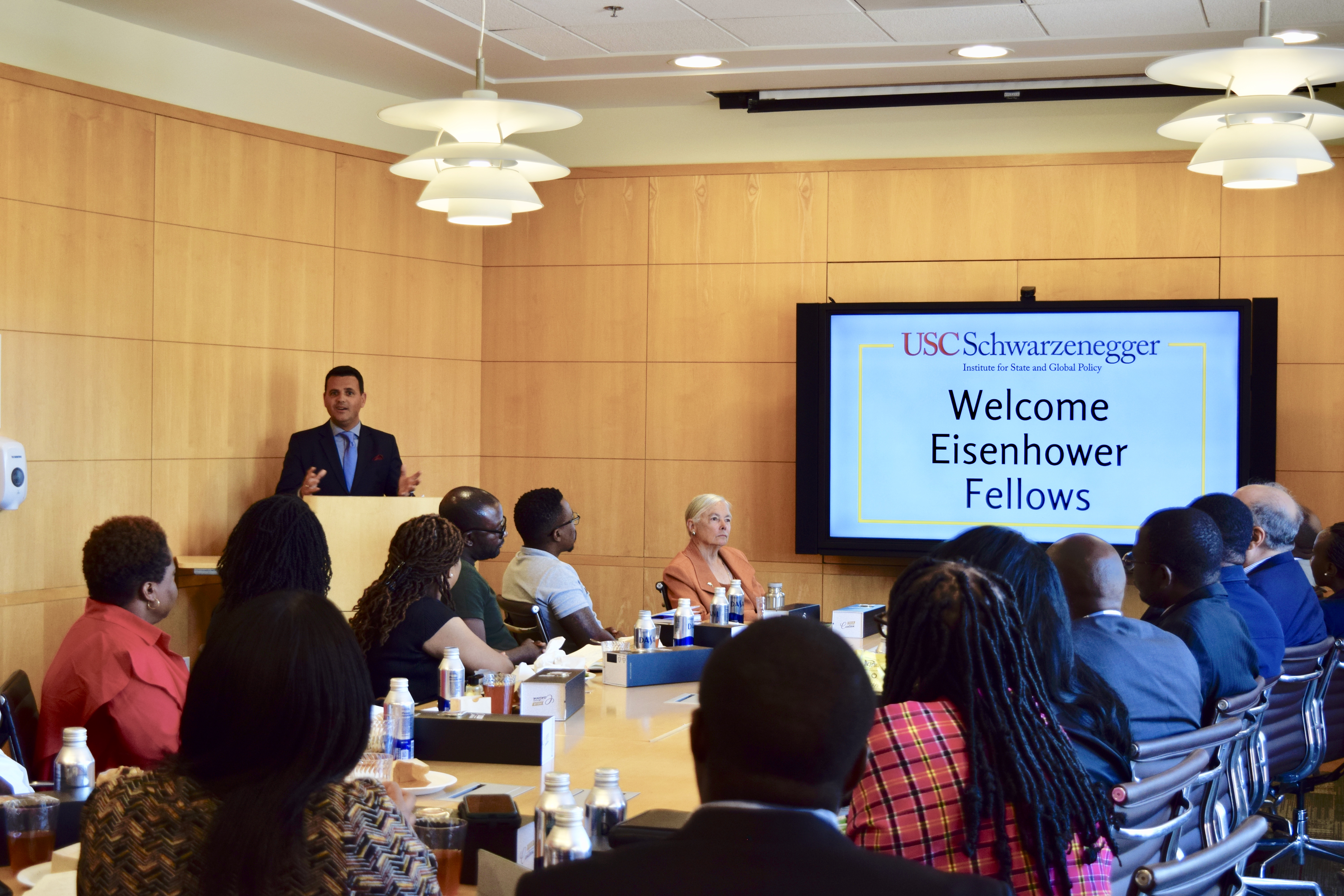By Matthew Kredell
The USC Schwarzenegger Institute hosted 20 Eisenhower Fellows from Africa working to address the challenges of pollution and global warming.
Members of the Eisenhower Fellowships’ Africa Program visited USC in the middle of a six-week tour of the U.S. to meet with experts and exchange knowledge related to sustainability, green investment and innovative solutions to combat air pollution and climate change.
Participants came from seven African countries and diverse fields including agriculture, housing, public safety, water quality, finance, food security, environmental protection and fashion.
At USC, the Eisenhower Fellows had the opportunity to hear from and interact with Fran Pavley, Environmental Policy Director at the USC Schwarzenegger Institute; Los Angeles Cleantech Incubator President and CEO Matt Petersen; Jake Levine, Chief Climate Officer for U.S. International Development Finance Corporation; and USC Associate Provost for Global Engagement Paulo Rodrigues.
“It’s a privilege to have such a fantastic group of young thinkers, leaders and doers on the grounds of the Univ of Southern California,” Rodrigues told the fellows. “We are proud of many things here at USC but, as one would suspect, I am most proud of our global footprint.”
Rodrigues went on to talk about the USC Africa Hub established in Nairobi, Kenya, in 2020, which provides USC students the opportunity to take classes in Kenya.
He also spoke of USC President Carol Folt’s commitment to sustainability paired with applied research to make a tangible global impact. This was seen in April when USC announced sustainability goals and eco-friendly initiatives during Earth Week.
Pavley, who authored the landmark climate policies championed by Gov. Schwarzenegger during her time in the State Senate, said the world has changed since that time.
“When we started all this 20-something years ago, we thought the impacts of climate change would maybe begin more like in 2050,” Pavley said. “This is way faster than what we thought, and we’re feeling it here in California.”
In response, she said that state departments are trying to make the shift from mitigation strategies to adaptation.
“That’s exactly the challenge we have right now because our focus was all about mitigation, reducing emissions globally,” Pavley said. “And now with adaptation and the acceleration of climate impacts, I’m seeing a shift of some of our resources from mitigation to adaptation. So we’re trying to figure out in all the different departments and things we do in the state, how we shift our focus to accomplish multiple objectives, emissions reductions and adaptation.”
One example is restoring watersheds and wetlands, which is good both for carbon sequestration and adaptation on flooding and sea-level rise.
Speaking with the group remotely from Washington, D.C., Levine explained the focus of the U.S. International Development Finance Corporation, the newest federal agency that uses a series of financing tools to invest in development around the world, with a focus on low- and middle-income countries.
Levine runs the climate team that seeks to diversify and scale investments in climate, with a particular focus on increasing adaptation.
The DFC’s equity financing tool made its first African investment in Daystar Power, a Nigeria-based solar power company.
“When you look at overall flows of climate finance, generally it is 90+ percent on the mitigation side, and that is not commiserate with the needs and impacts playing out around the world where climate change is here and communities are dealing with the impacts,” Levine said.
Petersen, who was chief architect of L.A.’s Sustainable City Plan during his time as L.A.’s Chief Sustainability Officer under Mayor Eric Garcetti, explained the mission of the Los Angeles Cleantech Incubator (LACI).
LACI unlocks innovation by empowering startups to accelerate the commercialization of clean technologies; convenes partnerships in transportation, energy and sustainable cities; and enhances community through workforce development, pilots and programs.
“Our model is to create an inclusive green economy,” Petersen said. “So we’re L.A.-focused. How do we help really create opportunity for everybody? The way we’re doing it is we’re helping incubate startups and helping local small businesses to want to increase their environmental, community and economic impact.”
Fellows asked Petersen how new technologies could be adapted in Africa and how to go about workforce training in rural African neighborhoods.
“Clearly, the entrepreneurs in the African continent can better tell us how should the technologies be adapted to be more useful in the local economies,” Petersen said. “I think the e-bikes and e-motorcycles are a good place to start. And then how to make automakers say let’s export the electric vehicles that are appropriate for Africa as well.”
After leaving USC, the group got a tour of LACI headquarters.
Delmwa Deshi-Kura from Nigeria explained the value of the Eisenhower Fellowship and how the tour of the U.S., and visit to USC, will help in her efforts to produce TV and film content for African social-impact projects.
“The Eisenhower Fellowship brings in leaders from across Africa with the goal to take what we’re doing, bring it into an environmental realm and teach us some of the best practices that are being applied globally and, even more critically, build networks,” Deshi-Kura said. “A lot of times, it’s not money that holds us back, it’s not being aware of new innovations that could relate to work you’re doing because you’re just not in certain circles. So the Fellowship has been a huge leap to connect us with the right people with the right information to help take our solutions forward, such as Matt and Fran. We’ve read about Fran extensively, and the work Matt has done with startups is a lot that we can take back home.”
Evodius Riutta, an Eisenhower Fellow from Tanzania, started an agricultural innovation lab, MAVUNOLAB, to work with agricultural start-ups to find solutions for post-harvest food loss due to spoilage. His project focuses on expanding African farmers’ access to solar-powered cold storage facilities to extend the shelf life of fresh produce.
As someone working with start-ups, he’s excited about making a contact with Petersen. And he wants to explore working with the USC Africa Hub in Nairobi.
“I think for us who are coming from Africa, the opportunity to connect with academic institutions in the U.S., especially those that have presences in Africa, opens the doors for partnership and collaboration,” Riutta said. “What I liked about today is you had a diverse group of speakers, one working with a federal agency in Washington, D.C., who spoke about adaptation financing, one who spoke about how start-up companies in the U.S. are trying to develop smart solutions, and one who spoke of a USC hub in Nairobi that is very close for me to hopefully work directly with USC. Thank you very much to USC and the Schwarzenegger Institute for inviting us.”
Arnold Schwarzenegger, who helped launch California’s reputation as a leader in addressing climate change during his time as Governor, wasn’t able to attend the visit due to a movie production but was pleased the Institute could welcome the Fellows.
“I’m ecstatic that the USC Schwarzenegger Institute could host such a distinguished group of Eisenhower Fellows poised to make a real difference for climate change in the continent of Africa,” Schwarzenegger said. “To face the challenges of pollution and global warming, we need action heroes like these making an impact around the world.”




